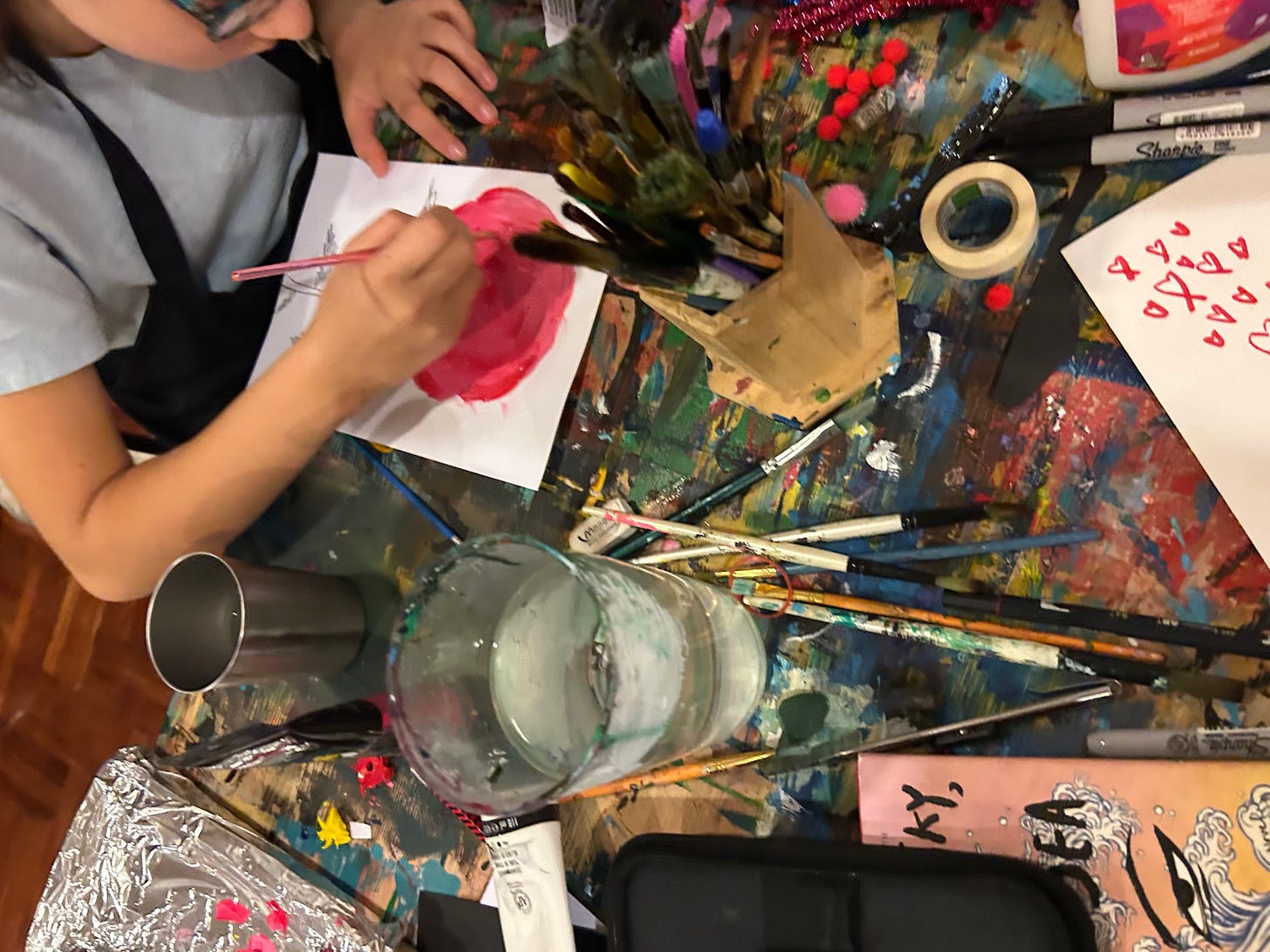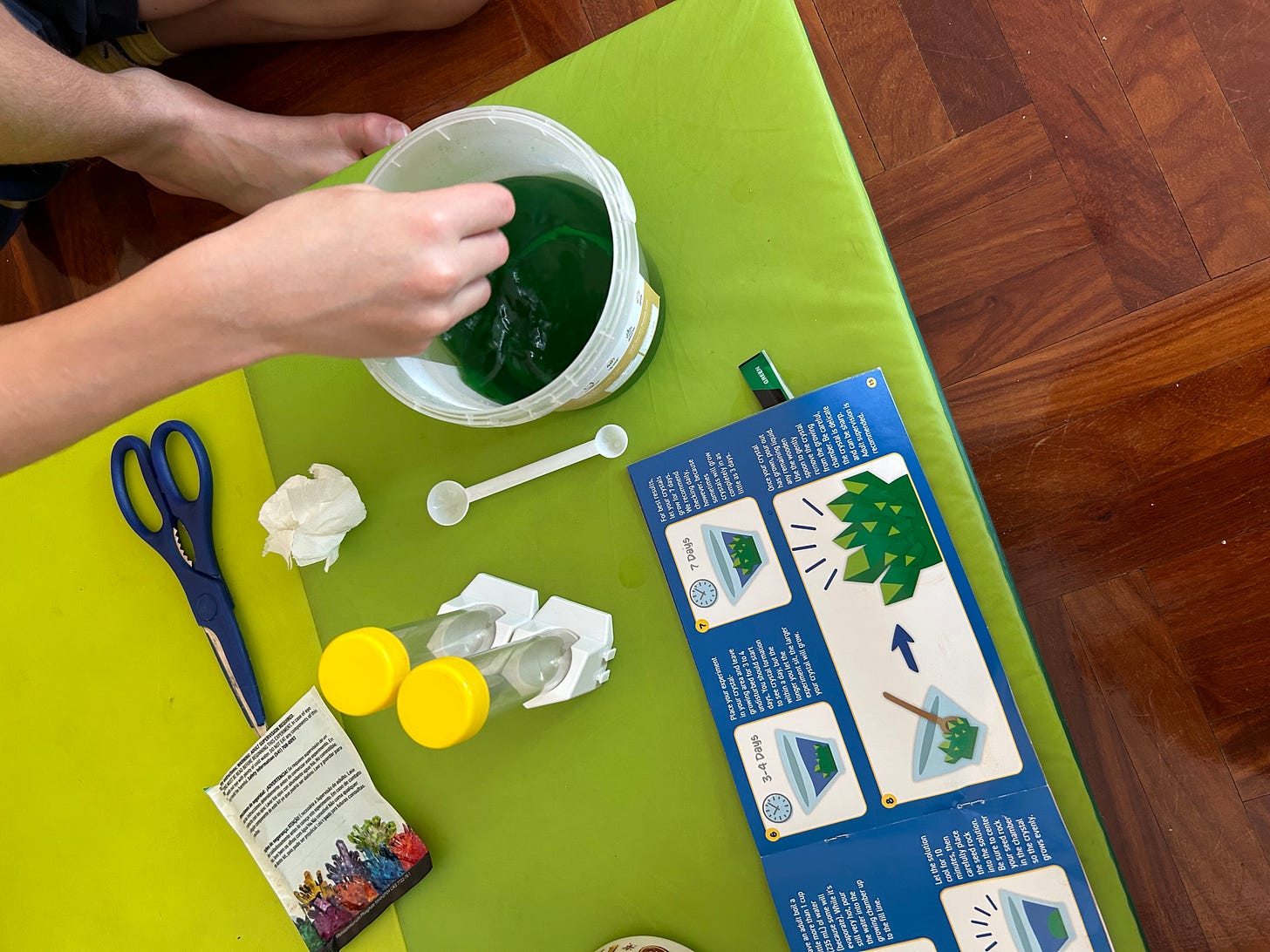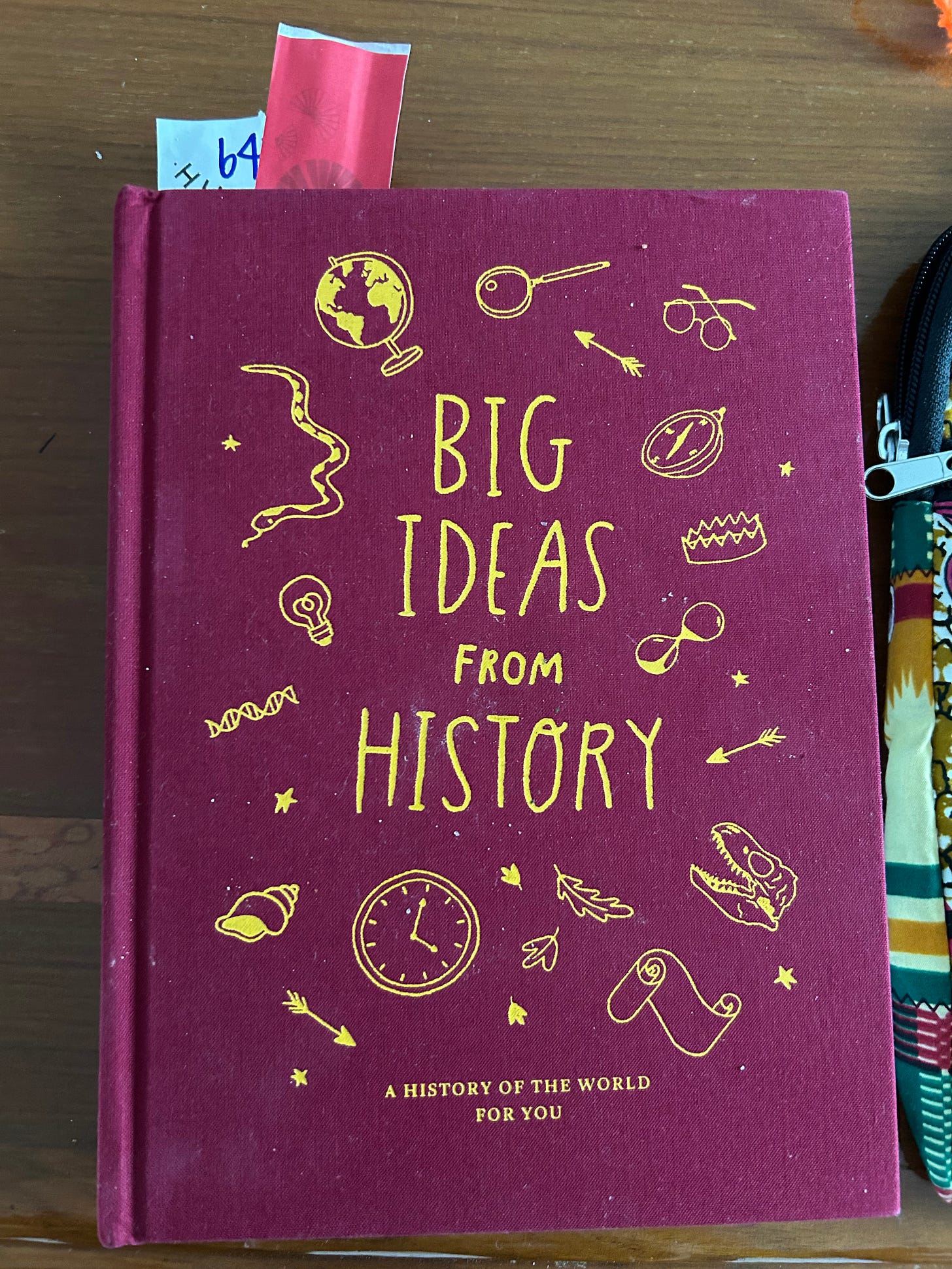The 5 levels of strewing (and beyond)
Also some news about membership, how we're unschooling rn, and thoughts on the individualism of home education.
I’m working on creating a more supportive, resource- and conversation-rich space for paid members who are working out how to centre consent in their homes, live in partnership with their children, and/or live without school.
And if you feel you could benefit from these things but would like to barter instead, also reach out - I offer all sorts of options including comp subscriptions.
(An audio version of this post is below, if you prefer to listen.)
Let’s talk about strewing.
I have a turbulent relationship with strewing, and I think the main reason is that I find it can sometimes feel manipulative - especially for children who are especially sensitive to pressure, demands or imbalances of power.
That said, I wanna talk about it because throughout the years of doing this work, I’ve heard so many different opinions and experiences of strewing and I find it super fascinating.
If you’re new to this term, strewing is in a very basic sense indirectly introducing or leaving things out for our kids to discover and engage in, with no strings attached.
As people who are raising self-directed learners, and who care about creating consent-based spaces, strewing works well because it can feel less confrontational to our children, as well as making it easier for our child to ignore or say no to.
Some examples might be leaving new books out in places our children are likely to find them, setting up an open ended activity on a desk or table or an outdoor space, unearthing a long-forgotten toy and placing it in a prominent place for our child to re-discover it, or even simply putting a roll of scotch tape out on your main workspace.
Strewing can go from being relatively labour-intensive, like setting up a potential science experiment, to just clearing a space and leaving an object of interest out for our child to find.
There are layers and levels of strewing! And I wanted to look at 5 ways that I have strewn/continue to strew. I’m also going to talk about my reservations around strewing and the ways it is not always, by definition, agenda-free! (Not all strewing is equal, it turns out.)
First, the 5 levels of strewing (I literally just made this up for the purpose of differentiating between one kind of strewing and another, and I’m pretty sure there are more than 5 ways to strew - in fact, feel free to pop your favourite way in comments!):
Setting up a specific activity
This is perhaps the least open-ended kind of strewing, because you’re essentially setting up an activity that has some sort of way or ways it needs to be performed.
There is a point to this: I’ve noticed that oftentimes the finding of materials and setting up of things is the bit that puts my kids off of actually doing a thing (I get it - I HATE the part of projects where you gather supplies and read instructions - it’s enough to put me off and I’ve had to work hard to stay calm and slowly work through the overwhelm.)
So I have sometimes pre-prepared an activity so that my kids can potentially jump right in.
This worked well when my kids were much younger, and would get distracted in the time it took for me to gather a bunch of resources. And it works well now that they’re older, because having a visual of a potential project is often more enticing than trying to explain what it’ll be like in words! (I often loose one of my kids while explaining what we need, how we do it, etc.)
The upside: These sorts of projects often get at least one of my kids excited.
The downside: It’s a lot of work, and you need to work on being okay if they aren’t into it. I had periods of my life when I found it really hard to create a whole activity and then hear no, over and over again, and so I took a break from doing this. I do it only occasionally now, and there tends to be more buy-in because it’s a novelty.
Setting up an invitation
This has big early childhood education vibes, at least for me - it’s the sort of thing I did when I worked in a preschool. I have heard people call it all sorts of things, and it can also look all sorts of ways, but typically it’s something we set up intentionally to encourage open-ended exploration.
So for example, you might pull out some art supplies and canvas, or you might pop the lego box next to some print-outs of lego builds with instructions.
It can be super simple, or much more complex - but I suppose the key here is gathering a selection of resources for open-ended play or work.
Some things my children have enjoyed is when I’ve left out math puzzles for them to solve over breakfast, magnetic poetry on the back of baking trays, or beads and strings to make bracelets.
The upside: You can use resources you already have in different ways, and set up is generally easy and quick.
The downside: Sometimes there is a lot of labour involved, and it can get messy. I remember setting up huge trays of sand with dinosaurs and other objects buried in them, or a tray of spaghetti I had died different colours, with various implements to explore and play with them, or tubs of water with sponges, soap and plastic toys to wash. It can get out of hand, especially when our kids are younger and perhaps willing to make a mess but not so much to clean it up.
Leaving objects out for them to find
I do this with books a lot, but also with random objects that I feel have become part of the scenery and are not being seen anymore, or maybe cool things I order online that I think the kids will love.
So like, I’ll pull out a puzzle that’s been hiding in a cubboard and leave it out on a clean(ish) surface. I might leave some cards at the breakfast table. I pop links to cool videos in my kids’ Trello boards. I pull out a bunch of clay and leave it on the art table. I say nothing, and if they are into the thing they will engage with it, and if they’re not I usually tidy it away after a day or two.
The upside: Super easy! Potentially inexpensive! Not so much planning or mental labour involved, and still potentially super fun.
The downside: Perhaps less engaging? Although that hasn’t been my experience. I’ve left a ball of yarn out and found the kids building booby traps around the house. And just placing toys in a different setting can be a big win, like the post below shows. (Btw Ashley has a great highlight on strewing in her IG stories).
Wondering out loud
This may not seem like strewing, but I think it counts as verbal strewing! I’ve found this is a great way to share what I’m thinking about with my children, without any direct pressure on them to listen to me ranting about something.
So instead of saying, “Do you know about Black Holes?” I might instead get curious about Black Holes myself and say something like, “Oh I wonder who discovered Black Holes,” or “I was reading about Black Holes the other day and I’m really curious about what they do.”
Black holes is a random example because I’m not particularly curious about them hehe.. but you get the gist.
I don’t tend to do this out of the blue - context matters! It would be super weird otherwise and feel odd.
The upside: it can lead to amazing conversations, rabbit trails, whole new interests that we can share, lots of googling, and more. Aaaand, it’s literally so easy to do ;)
The downside: Not necessarily a downside, but sometimes my kids just shrug and change the subject - and if I’m committed to respecting them and centering consent, that has to be okay. I just drop it, or I look it up myself! Otherwise it’s a pretty low-stakes activity and if we don’t come in with an agenda, there isn’t really a downside.
Just doing a thing myself
No words, no heads’ up, I just pick up a bunch of supplies and start doing the thing. Sometimes they join in. Mostly they don’t, but I am still modeling that I can learn and try new things, that I can be bad at new things and improve, that I can teach myself cool skills, and that I have a life and intend to live it! Plus, I’m usually doing something I enjoy doing so it’s really a win-win!
When is strewing actually just pressure, or imposing an agenda?
This is a tough one. I stopped strewing at times because my children could literally sense my agenda a mile away, and refused to do the thing just in principle.
Instead, I just asked them! Becuause that’s what I would do with another adult, right? I would simply ask whether they wanted to read a book, or bake something. And respect their answer.
So why not simply ask? Or hand them a book and say, “I thought you might like this?”
Well, it’s not always as simple as that. I don’t think there’s anything wrong with just asking, of course, if our children know that we have no attachment to whether they accept or not. (And that’s a big If).
Some children will do amazingly from just being asked. And others, who are perhaps more demand-avoidant or have a stronger drive for autonomy (hello PDAers!) might have a hard time saying yes to a direct question, or accepting a direct invitation, even if they do want to do the thing! (Trust me, this is a thing. I do this with my husband all the time!)
So even though strewing may *seem* a little manipulative because it’s indirect, actually for some people it *feels* less manipulative because the demands and expectations of a direct question are not present.
That said, some children are so sensitive to manipulation that even strewing can feel full of hidden agendas, and that’s something for us to work through with our children.
My personal strewing principles (that keep me honest):
Strewing is not my way to impose a hidden curriculum. I only strew things that I know, or at least have reason to believe, my children are likely to be genuinely into. This way prevents me from trying to impose what I think they should be doing on them (plus, they can smell this a mile away). So for example, my daughter is not into science experiments and I don’t even try. If I’m ever concerned she’s perhaps shutting herself off from knowledge that might benefit her (the whole they don’t know what they don’t know thing!), then I’ll simply talk to her about my worries - but I’d rather be direct about what worries me than surreptitiously try to strew things to calm my own fears. I’ve realised that this usually leads to her saying she’d be open to watch a documentary or read a book or simply chat to me about a topic.
If I wonder something out loud, it is because I ACTUALLY am wondering about it and it has come up in conversation, or it’s something I’ve perhaps read about or seen and actually want to know more about. I share what I’m reading with my children, and often they want to know more.
Before I set up anything elaborate, or buy anything pricey, I ask them. This doesn’t have to be a thing for you, but for me, it just prevents me from feeling annoyed I put together and/or bought a bunch of materials that will forever sit unused in some cupboard.
I get into things myself because I actually want to do them, not as a way to get my children to do them.
I have no issues with sharing my own thoughts, ideas or things I’ve learned directly with them - just as I do with a friend, family member or my husband. If I see they are glazing over or not listening, I know this isn’t the right moment and I let it go. I’m not really in the business of “teachable moments,” so I don’t use experiences to teach a lesson - I trust that they are always learning something and that often, it’s a process. But I also don’t see anything wrong with sharing my thoughts, beliefs, values, interests and engaging in a conversation about them when it feels like a good time or appropriate.
What are your thoughts on strewing? Do you do it, or not? And why?
If you do, do you have a way to organise your strewing - like a document with ideas you think of ahead of time? Or do you just wing it?
Some more resources on strewing:
When your kids strew thing for you
WHAT I’M LISTENING TO
I started listening to Serial’s new podcast about Guantanamo. It’s so good.
Also finished The Retreat, a podcast looking into Vipassana mediation and when it goes wrong. (Heads’ up this can be a hard listen if you’ve struggled with mental health issues.)
Obsessed with The History of Freedom - this episode on the free market and capitalism was really thought-provoking.
WHAT I’M READING
I had some surgery earlier this week (it went well! I’m recovering) and I brought The Sicilian Inheritance with me as my hospital beach read. It was pitched just right for my state of mind!
HOW WE ARE UNSCHOOLING
I bought Big Ideas from History and P and I have been picking out chapters to read. It’s pretty good - and it has sparked some convos about how some of the chapters are missing important information.
L has been very dedicated to his golf practice this week. One thing you might not know about him is that he has been swinging golf clubs since he could walk, and he is almost entirely self-taught (because he doesn’t want to take lessons).
It’s been a week of just doing very little because it was Songkran here (which is Thai New Year, and happens over the span of 3 days of intense partying and water fights in the streets), and then I was off on my hospital vacay (massive euphemism), AND we’re getting ready to leave Bangkok in three weeks so day to day unschooling is even more laid back than usual - and that’s okay.
WHAT IS RADICALIZING ME
What isn’t? I feel like if we aren’t digging deeper and exploring solutions right now, we never will.
I think the most radicalizing thing for me this week has been re-committing to working towards accessible information, research and practice on self-directed education, and trying to get involved in ways we can bring more ideas of youth rights and self-direction and consent to spaces that are publicly funded or at the very least accessible.
As much as we are here figuring out how to parent and educate our children - this cannot be an individualistic endeavour.
I think that is the crux of it - it is just not enough for us to take our children out of systems, or raise them in radically different ways. This HAS to be accessible for more people.
In his book, Unlearning Shame, Devon Price looks at the different ways we can all engage in movements, and the idea that there is no higher or better way to do it - we are all different, we all play to our strength and capabilities.
It reminds me of some of the online discourse around feeling like we’re never doing enough - we are though. We were never supposed to do everything ourselves. We are only one person, in a movement of people - this is not about us, individually.
This is also a thought-provoking piece by Devon Price about why he doesn’t want to be an activist anymore.
Head’s up to you all that I’m making some small changes in terms of regularity of posting on here.
I will be doing 2 paid posts a month and 2 paid threads a month - the Weekend Posts will be a deeper dive into big topics (sometimes practical, like this one, and sometimes theoretical, AS WELL as the usual links), and the threads will be a chance to have more concrete, honest conversations about how we do what we do and share support and experiences.
I’m doing this because I don’t want to bombard you all with too much, and also because having more time to work on my posts will make them better! More supportive, hopefully, and more resource-rich.
I’ll still be doing DITLs, free & paywalled essays, podcast episodes and our monthly zoom :)
Thank you for your patience while I figure out how to give you all extra value while also not working myself to exhaustion!
I hope you all have a wonderful weekend!












Wondering out loud is pretty much the only strew that works in our home without any form of coercion. Somehow it always seems to take root at bedtime? 🤔
Strewing doesn’t usually work for my demand avoidant child but I think at times it can be more non coercive than suggesting things to do or asking if they want to do something (boredom is challenging!) The demand of deciding what to do and getting all the stuff to do it is a lot. Not to mention that both of my kids can struggle with not knowing if they want something until it is right in front of them. If paints and paper are out on the table as an option with no expectation that they will be used, someone might enjoy painting but it takes a lot of motivation and effort to remember that you like painting and get out all the supplies if it’s not already there.